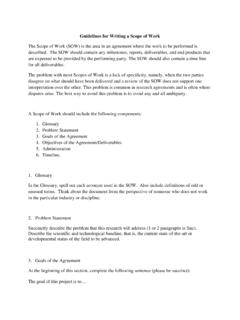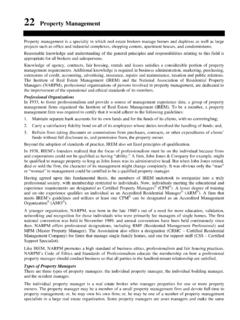Transcription of Lesson 1 INTRODUCTION: SCOPE & NATURE OF HOTEL …
1 Lesson 1 INTRODUCTION: SCOPE & NATURE OF HOTEL management Aim Explain the range of hotels in operation and their management policies. For a successful career in the HOTEL management industry, you must: understand the NATURE and structure of the hospitality industry be aware of the contemporary issues relevant to the industry develop generic business skills that are required in today s business environment (eg. Communication, management , marketing, planning) THE HOTEL INDUSTRY The role of the HOTEL industry stems from a long history and development in the field of hospitality provision. In many countries hotels have evolved as extensions of domestic hospitality; though typically they are more often larger establishments (particularly in developed countries) Industry groups in different countries may define a HOTEL in different ways. A typical definition might be: A HOTEL is an establishment of a permanent NATURE , which consists of four or more bedrooms, and offers bed and breakfast on a short term contract and provides certain minimum standards (Ref: Hotels and Catering Economic Development Committee, South Africa).
2 Hotels may be classified in many different ways, for different purposes, to different countries. The main reasons for classifying hotels are: To analyse the market sector and so aid: (a) Comparisons. (b) Analyses of performance. (c) Identifying market gaps. (d) Marketing strategies. (e) Customer requirements. To describe the type of HOTEL for advertising and promotional purposes: A HOTEL may be described in terms of the following: (a) Location Urban Suburban Rural Island Airport Resort Tourism Centre (near attractions) Business Centre (b) Form of ownership independently owned HOTEL chain Franchise Syndicate owned (c)
3 Facilities Boating Golf Conventions Ski Condominiums Business Centres Cable Television, in house movies Room Service Menu (d) Type of client Business people Community Tourist Traveller Holiday maker Family (e) Standard First class luxury Good Medium Small (less than 50 beds) (f) Star rating eg. 1, 2, 3, 4, 5 stars (g) Size Number of beds or bedrooms. A HOTEL may fit into more than one category. This may be a deliberate policy in order to appeal to a wider market, to encourage greater occupancy or a more even pattern of occupancy.
4 The diversity and changing patterns of HOTEL use often make precise classification difficult, and new forms of accommodation are being introduced to cater for specific needs, for example, holiday villas, condominiums, time-share. THE SCOPE OF THE INDUSTRY 1. Accommodation Throughout this section "accommodation" is interpreted in a wide context to include any premises where any of the housekeeping, reception, maintenance and cleaning services have to be provided on a larger scale than in a domestic dwelling. The establishment need not necessarily include sleeping accommodation. In its simplest sense, accommodation is taken to be the provision of shelter, that is, four walls and a roof. Thus accommodation management is taken to include: (a) The provision of accommodation to suit the purpose and the needs of the users. (b) The selling, marketing and promoting of accommodation. (c) The care, maintenance and security of the accommodation.
5 (d) The care, well-being, satisfaction and comfort of the accommodation user. The accommodation industry may classify establishments into two groups according to whether the aim is to make a profit, or purely work with the constraints of a budget and maintain a break-even situation. (a) Profit making establishments - such as hotels, restaurants, contract cleaning companies. CLASSIFICATION AND RATING SCHEMES To assist guests and tourism professionals, various classification schemes have been developed. Though there are exceptions, the more important schemes are roughly a comparable standard around the world. Some facilities though that may be considered three star in one country might not be in another (eg. tea and coffee making facilities are far more common in Australia and New Zealand than some other countries). Examples of Star Ratings For Motels, Hotels & Resorts: * Offer basic standard accommodation. Simply furnished, adequate lighting.
6 Motel units have private facilities, but hotels and resorts may have shared bathrooms. ** Well maintained with an average standard of furnishings and fittings. ** Well appointed; comfortable standard of accommodation, furnishings, lighting, cooling and heating. Rooms contain telephone, clock radio, tea & coffee facilities with light breakfast available. ** Exceptional standard with high quality furnishings and fittings. High standards in presentation and guest services; restaurant on site, air conditioned rooms, comfortable lounge, hair drier, etc. ** International style and superior standard, extensive range of first-class services including 24-hour room service, and additional shopping and recreation facilities. For Serviced Apartments * Basic accommodation with moderate comfort. ** Average accommodation with higher degree of comfort. ** Good accommodation with better furnishings. ** Very good accommodation, with very high standard of comfort and at least one separate bedroom.
7 ** Very good with very high standard of comfort & furnishings, must have at least one separate bed room. ** Excellent, luxuriously appointed, all sleeping areas and bed rooms are separate to the lounge. ** International quality with an extensive range of first class guest facilities and services. (b) Non-profit making establishments - such as provincial hospitals, senior citizen's homes, student residences. 2. The Role of the Accommodation Manager The responsibilities of the accommodation manager will include some, or all of the following: (a) Assessing manpower requirements (b) Recruitment and selection of manpower (c) Induction and training of manpower (d) Deployment and scheduling of manpower (e) Supervision of manpower (f) Quality control (g) Inspection of premises (h) Developing standard methods for performing tasks (i) Increasing productivity (j) Welfare of personnel (k) Hygiene control (l) Pest control (m) Waste control (n) Selection and purchasing of supplies (cleaning agents, equipment, etc.)
8 (o) Selection and purchasing of "linens" and soft furnishings (p) Selection and purchasing of all surfaces (floor coverings, wall coverings, furniture, etc) (q) Stores control (r) Linen control and laundering (s) Cleaning and maintenance of the premises and plant (t) Redecoration and up-grading schemes (u) Capital building projects (v) Interior design (w) Health, safety, fire and security arrangements (x) Care and welfare of the building user that is the client or personnel. In certain types of establishments, such as hotels or conference centres, the accommodation manager may also be responsible for front office operations and conferences. Accommodation management is a well established activity in certain types of operations (eg. hotels, hospitals and halls of residence. These all tend to have a well-defined organisation structure). ACCOMMODATION PRODUCTS Accommodation Clubs Guests can apply and join this type of club and obtain discounts on tariffs, and perhaps other services as well (such as discounts from certain car hire firms), eg.
9 Best Western s Gold Crown Club, Flag Inn Guest Programs Each guest visit is recorded, and when a certain number of visits within a chain or group is reached, a benefit (eg. a free night) can be claimed. Accommodation Passes A certain quantity of accommodation (eg. nights stayed) can be purchased in advance, usually at a discount. These passes are usually only valid for a particular period of time; frequently 12 months. Gift Certificates Some accommodation groups (eg. Marriott and Hyatt hotels) sell certificates which can be used at any properties within their group. Use of the certificate may be subject to availability at the time of the claim, and may not be valid during busy periods. 3. The Client It must be remembered that the client, whether identified as a customer, guest, patient, student or visitor, is of the utmost importance because the premises and services are provided for his or her benefit. In some operations, where the management of the accommodation is not the main purpose of the operation, for instance, in a hospital or a school, it is easy to lose sight of the fact that a service, which is secondary to the main purpose, is being provided for the benefit of the building user, for example, the patient, with whom the manager of that service does not usually have direct contact.
10 The health, safety, welfare and comfort of the client are of the greatest importance. ESTABLISHMENT SIZE Establishments can be very small, in only one location; or very large in many locations (or anything in between). Hotels are small or large because: the extent of the market NATURE of the product difficulties of exploiting technical economics of scale. There are only so many people who demand accommodation in a given area, and it is the number of people and the extent of the accommodation which determine the optimum number of bed spaces. There is clearly no point for building a two hundred bed space HOTEL , if the maximum demand for most of the year is only one hundred bed spaces. Some people prefer smaller hotels, while others prefer larger ones. Both have unique advantages and disadvantages (medium sized hotels may have neither the advantages or disadvantages of being small or large) The NATURE of the product in the HOTEL industry also determines that most units will be small.







